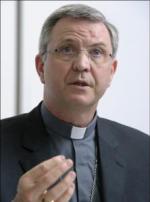
CHALLENGES FOR CHRISTIANITY AND FOR THE CHURCHES
‘Questa trasfusione della memoria ci permette di ispirarci al passato per affrontare con coraggio il complesso quadro multipolare dei nostri giorni, accettando con determinazione la sfida di ‘aggiornare” l’idea di Europa. Un’Europa capace di dare alla luce un nuovo umanesimo basato su tre capacità: la capacità di integrare, la capacità di dialogare e la capacità di generare’.
(Papa Francesco, 6 maggio 2016, Conferimento del Premio Carlo Magno, Vaticano, Sala Regia).
1. Intregration
- the inner-catholic challenge of integrating different historical, cultural or ecclesial realities into a more effective and inspiring catholic ‘communion’ (different Catholic realities in Eastern-Europe; Western-Europe and Southern-Europe; different branches in Catholic thinking and commitment);
- the ecumenical challenge: a question that finds its origins in European history and is still looking to Europe for finding new paradigms of growing together in unity; the urgent need of a new ecumenical spirit and openness in Europe;
- the cosmopolitan challenge of Christianity particularly in our major cities and agglomerations; how do we integrate Christians coming from all over the world into a new network of local communities, that reach beyond the natural borders of nations, language, culture?; integration at the local level as a primary witness to the Gospel.
2. Dialogue
- a unique role for the Churches in Europe in fostering and mediating interreligious dialogue with other religions (Jews; Muslims; Eastern religions); the universal dimension of salvation in Jesus Christ, of Christianity and of the Church as a potential and a mission for building bridges between religions;
- a particular role for the Churches in Europe for developing a constructive dialogue with secularization, agnosticism or atheism; in Europe, both Christians and non-Christians are children of the Enlightenment, of rationalism and of scientism; both are searching for new paradigms in dealing with the “other dimension”;
- the challenge or test is not in the universal but in the particular: how can Christian communities become active places of dialogue and meeting; see what happened in France the weekend after the murder of father Jacques Hamel.
3. Creativity
- Churches can enlarge the horizon of life; only large horizons generate creativity: lager than someone’s own country, people or culture; larger that the short time purposes or initiatives; larger than my happiness or satisfaction; the vision of the Kingdom of God; the Church as one worldwide family;
- creativity requires and supposes a sense of belonging; the Church as an all-embracing family; the Gospel and God’s mercy; the creativity of mercy; too many people lose their deepest energy or creativity by feeling abandoned or rejected;
- Churches should foster the creation of local, small-scale experiences that really change the lives of persons, that give them a new energy and hope, that give sense to their lives; that make them free from apathy or disinterest, mistrust or pessimism; ‘communities of hope’.
